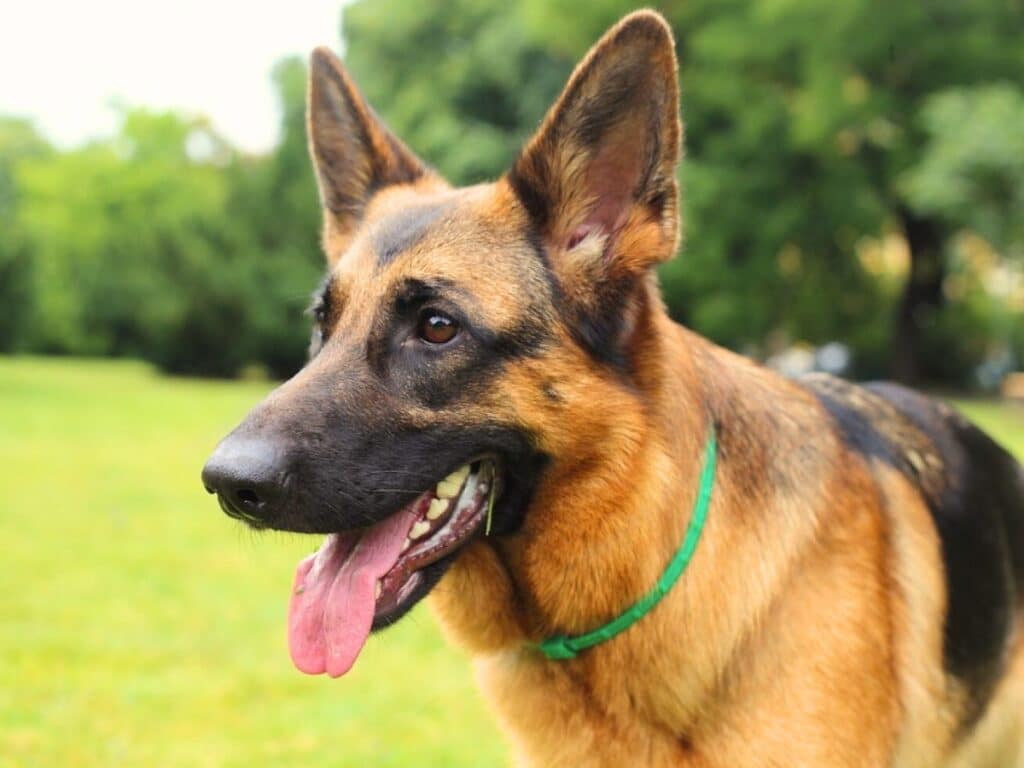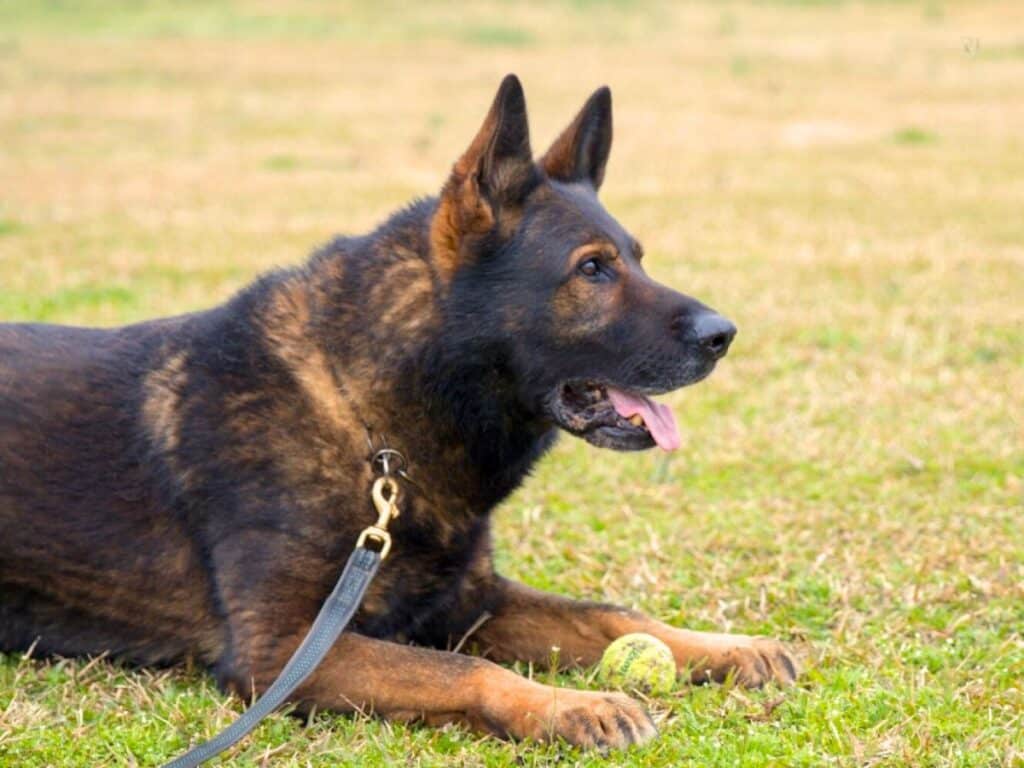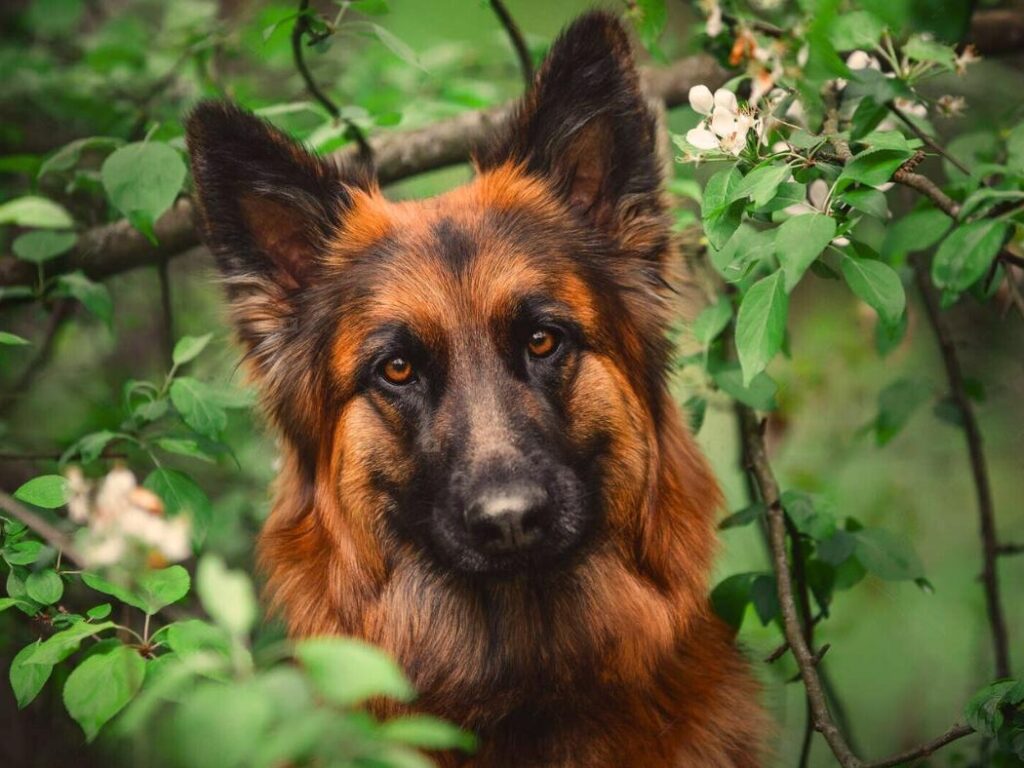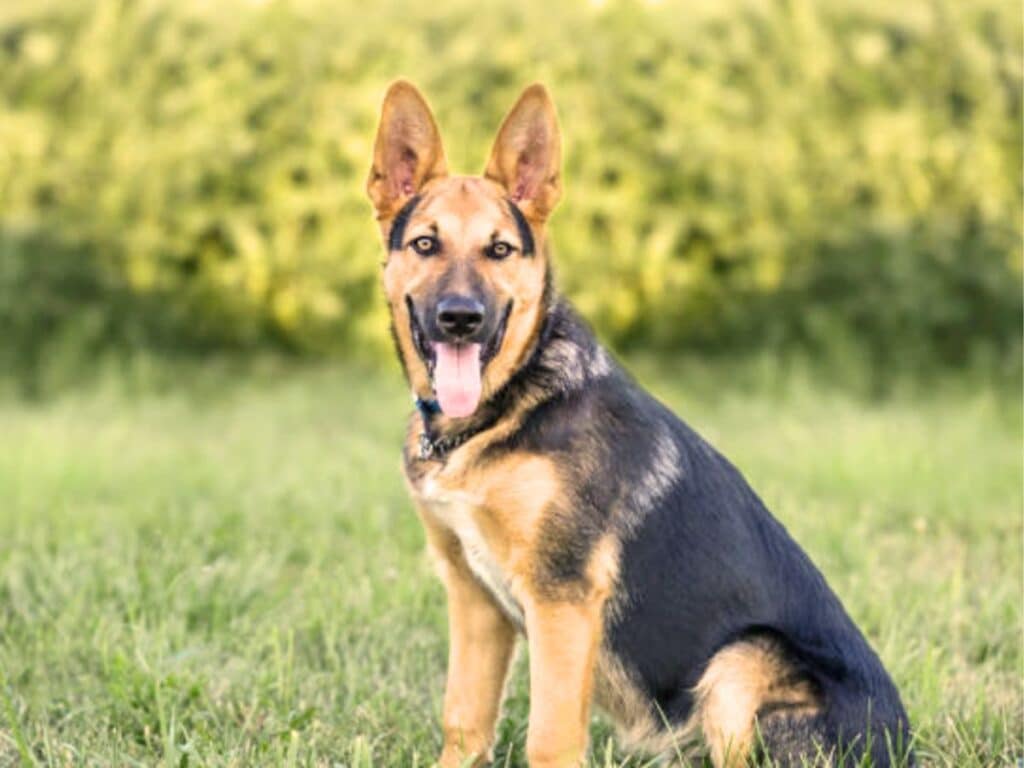The short-haired German Shepherd is known for its distinctive short and dense coat.
It’s important to understand that German Shepherds come in both short and long-haired varieties. However, the short-haired variety is a lot more common.
Max von Stephanitz, a German breeder, is credited with creating the modern German Shepherd breed in the late 19th century. Since then, they have become highly sought after as working dogs in fields such as law enforcement and search and rescue.
In this article, we’ll dive into the fascinating world of Short-Haired German Shepherds, exploring their unique traits, training & grooming tips, and the endless joy they bring to their lucky owners.
What Is a Short-Haired German Shepherd?
A short-haired German Shepherd, also known as a stock coat or smooth coat German Shepherd, refers to a variation of the German Shepherd breed with a shorter coat length.
These GSDs have a sleek and dense coat that lies closer to the body.
The short-haired German Shepherd retains all the qualities and characteristics of the breed, such as their intelligence, loyalty, and versatility.
They are known for their strong work ethic, trainability, and suitability for various tasks, including herding, search and rescue, police work, and as family companions.
The shorter coat of these dogs requires less grooming compared to their long-haired counterparts.
It sheds moderately throughout the year and might have a heavier shedding period during seasonal changes.
Regular brushing can help keep their coat clean and remove loose hairs.
It’s important to note that the term “short-haired German Shepherd” is not recognized by official breed standards.
However, it is commonly used to describe German Shepherds with shorter coats, and they are still considered purebred German Shepherds.
Long-haired German Shepherd vs. Short-haired German Shepherd

Short-haired German Shepherds have a shorter coat length compared to Long-haired German Shepherds (duh!)
The most noticeable difference between the two types of German Shepherds is their hair length.
Short-haired German Shepherds have a coat length of around 1 to 2 inches, while long-haired German Shepherds have a coat length of around 3 to 4 inches.
The short hair on the short-haired breed lays flat against the body, giving them a sleek appearance.
On the other hand, the long topcoat of long-haired shepherds fringes at the end and gives them a fluffy look.
Both types come in different colors
Both long and short-haired German Shepherds can come in many color variations.
However, the most common colors are black and brown or black and tan. They can also come in gray, all-black, red and black, black and silver, bi-color, or all-brown.
In German Shepherds, there are certain color variations that are considered rare compared to the more common color patterns. These rare colors include white, blue, liver, and panda.
RELATED: 14 German Shepherd Colors Explained In Detail
Long-haired GSDs require more grooming than short-haired GSDs
Due to their long hair, Long haired German Shepherds require more grooming and maintenance compared to short-haired ones.
Owners need to brush their coats regularly to prevent matting and tangling that can lead to discomfort for the dog’s skin.
Slightly Different Temperaments
While both types share similar temperaments and personalities as intelligent dogs with high energy levels that need regular exercise; they differ slightly in behavior based on their breeding purposes.
Long-haired dogs are mainly bred as family pets due to their fluffy appearance and eager-to-please behavior; hence they tend to be calmer and friendlier than their counterparts.
On the other hand, Short-Haired German Shepherd dogs are used as police or guard dogs because of their athleticism and energetic nature; hence they are aloof with strangers but very loyal when trained correctly.
Different Uses
Short-haired German Shepherds are more likely to be used for shows or as guard dogs and police dogs.
They are often highly trained and more active, often coming off as aloof and serious.
Long-haired dogs are almost always used as family dogs due to their fluffy appearance and eager-to-please behavior.
Shedding
Short haired German Shepherds shed less compared to long-haired ones, making them ideal for people with allergies or those who prefer a cleaner home.
Preference
While both types of German Shepherds have similar temperaments and personalities, some people may prefer the appearance of one over the other based on their preference for hair length.
RELATED: How To Buy a German Shepherd Puppy
Personality Traits and Temperament of Short-Haired German Shepherds

1. Loyal and Protective
Short haired German Shepherds are renowned for their loyalty and protective nature.
They have an innate ability to protect their owners and their property, making them great watchdogs.
This trait makes them one of the most sought-after breeds for families with children or those who live in areas with high crime rates.
Their natural instinct to protect can sometimes make these dogs overprotective, which may lead to aggression towards strangers or other animals.
Early socialization and proper training can help prevent this behavior.
2. Highly Intelligent and Trainable
These dogs are highly intelligent dogs that are easy to train. They excel in obedience training, agility, search-and-rescue missions, and police work.
Due to their intelligence, they require mental stimulation to keep them engaged and prevent boredom.
Training should start early in a puppy’s life as it helps establish good behavior patterns that will stay with them throughout their lives.
Consistency is key when training GSDs as they respond well to positive reinforcement.
3. Confident Personality
These dogs have a confident personality that comes from their breeding history as herding dogs.
Their confidence makes them great working dogs that can handle any task assigned to them.
However, this confidence can also make GSDs aloof towards strangers or people they don’t know well. It’s important to expose your dog to different people, environments, sounds, smells so they can learn how to socialize properly.
4. Exercise Needs
Short haired German Shepherds are active dogs that require regular exercise and mental stimulation.
Daily walks or runs are necessary for keeping them healthy both physically and mentally.
Without enough exercise or activities to keep them busy, dogs may become destructive by chewing furniture or digging holes in the yard.
Boredom can also lead to anxiety and depression, which can affect their overall health.
5. Great Family Pets
Short-coated Shepherds make excellent family pets when properly socialized and trained. They are loyal, protective, and affectionate towards their families.
Their intelligence and trainability make them easy to teach good behavior patterns that will stay with them throughout their lives.
When introducing a GSD into a household with children or other pets, it’s important to supervise interactions until they get used to each other.
Early socialization is crucial for ensuring that your dog grows up friendly towards everyone.
RELATED: Straight Back German Shepherd vs Sloped Back GSD
Are Short-Haired GSDs Allowed to Compete or Be Registered?

Yes, they are allowed to compete and be registered in various organizations such as the American Kennel Club (AKC) and the United Kennel Club (UKC).
German Shepherds are one of the most popular breeds in the world, known for their intelligence, loyalty, and versatility.
The AKC recognizes short-haired German shepherds but considers the long-haired variant as a fault.
Short-coated Shepherds may not be as eye-catching as their long-haired counterparts.
However, this does not mean that they cannot excel in other areas such as obedience, agility, tracking competitions, or even just being a loving companion.
Are Short-Haired GSDs Rare?
Short-haired German Shepherds, also known as stock coat or smooth coat German Shepherds, are not considered rare.
While the long-haired variety may be preferred by some individuals, short-haired German Shepherds are quite common and recognized as a legitimate coat type within the breed.
The popularity of the long-haired variety may give the impression that short-haired German Shepherds are rare, but this is not the case.
Both coat types can be found in litters of German Shepherds, and their occurrence depends on the genetics of the breeding pair.
Some breeders specialize in producing short-haired German Shepherds, while others focus on the long-haired variety or a mix of both.
The preference for one coat type over the other is often subjective and varies among individual owners, breeders, and enthusiasts.
Some people may prefer the sleek appearance and low-maintenance aspect of short-haired German Shepherds, while others may appreciate the longer, flowing coat of the long-haired variety.
Ultimately, the choice between short-haired and long-haired German Shepherds comes down to personal preference and the specific needs of the owner.
Health Problems

GSDs make great pets and working dogs, but like all breeds, they can be prone to certain health problems.
Hip Dysplasia
Hip dysplasia is a genetic condition that affects the hip joint and can cause pain and discomfort. It occurs when the ball and socket joint of the hip do not fit together properly.
This causes wear and tear on the joint over time, leading to arthritis and other degenerative joint diseases.
Short-coated Shepherds are particularly prone to hip dysplasia because of their breeding history.
Breeders have often focused on creating dogs with a sloping back, which puts extra strain on their hips. This has led to an increased incidence of hip dysplasia in the breed.
If your GSD has hip dysplasia, you may notice them limping or having difficulty getting up from lying down.
Treatment options include weight management, exercise modification, pain medication, physical therapy, and surgery in severe cases.
RELATED: Hip Dysplasia in German Shepherds
Degenerative Myelopathy
Another health problem to watch out for in German Shepherds is degenerative myelopathy (DM).
DM is a progressive disease that affects the spinal cord and can lead to paralysis. It typically begins with weakness in the hind limbs and progresses slowly over time.
DM is caused by a mutation in a gene that affects nerve function. While any dog can develop DM, it is more common in certain breeds like the German Shepherd.
Unfortunately, there is no cure for DM at this time. Treatment options focus on managing symptoms and improving quality of life for affected dogs.
This may include physical therapy, mobility aids, and pain medication.
Bloat
GSDs can also be susceptible to bloat, a life-threatening condition where the stomach fills with gas and twists on itself. (Source)
This can cause the blood supply to the stomach to be cut off, leading to tissue death and shock.
Bloat is a medical emergency that requires immediate veterinary attention.
Symptoms of bloat include restlessness, pacing, drooling, retching without vomiting, and a distended abdomen.
Preventing bloat in GSDs involves feeding smaller meals throughout the day instead of one large meal.
You should also avoid exercising your dog immediately after eating and limit their water intake during meal times.
RELATED: German Shepherd Bloat: Symptoms & Treatment
Skin Allergies and Infections
Finally, short-haired German Shepherds may be at risk for skin allergies and infections. These can cause itching, redness, and discomfort for your dog.
Skin allergies in dogs are often caused by environmental factors like pollen or dust mites. Infections can occur when bacteria or fungi enter broken skin or hair follicles.
If you notice your dog scratching excessively or developing skin lesions, they may have an allergy or infection.
Treatment options include medicated shampoos, topical creams or ointments, oral medications like antibiotics or antihistamines depending on the underlying cause of the problem.
Size and Grooming Needs of Short-Haired German Shepherds

How big do short-haired German Shepherds get?
Short-haired GSDs are medium to large-sized dogs, typically weighing between 50 to 90 pounds.
Males are usually larger than females, with an average height of 24-26 inches and a weight of 65-90 pounds.
Females, on the other hand, have an average height of 22-24 inches and a weight of 50-70 pounds.
How to groom a short-haired German Shepherd?
While they have a short coat that is easy to maintain, short-haired German Shepherds still require regular grooming to keep their coat healthy and shiny.
They shed moderately throughout the year but heavily twice a year during shedding season.
Brushing them once or twice per week helps remove loose hair and dirt from their coat while distributing natural oils evenly throughout their fur.
Bathing them every three months or as needed can help keep them clean and smelling fresh.
It is also essential to trim their nails regularly as long nails can cause discomfort or even pain when walking or running.
You should also clean their ears weekly using cotton balls or pads moistened with ear cleaner solution to prevent infections.
Do short-haired German Shepherds need haircuts?
Short-haired German Shepherds do not require haircuts as their coat is naturally short and dense.
However, regular grooming is still essential to keep their coat healthy and shiny.
Trimming the fur around their ears, paws, and tail can help keep them clean and tidy.
Exercise Needs

Due to their size and energy level, short-haired German Shepherds are best suited for families with a yard or ample outdoor space for them to play and run around.
They require at least 30-60 minutes of exercise daily to stay healthy both physically and mentally.
Some activities that you can do with your dog include hiking, running, playing fetch or frisbee in the park or backyard, swimming, agility training classes which helps improve obedience skills while providing mental stimulation.
Training Requirements
Proper training is crucial for GSDs since they have a strong protective instinct towards their family members.
Early socialization will expose them to different people, animals, sounds which helps reduce anxiety around new experiences.
Positive reinforcement techniques such as treats or praise work best when training these dogs since they respond well to positive feedback.
Consistency in training will help establish good habits which will prevent destructive behavior such as chewing on furniture or digging holes in the yard.
Short-Haired German Shepherds and Cold Weather

The Double Coat of Short-Haired German Shepherds
Short-coated shepherds have a double coat that provides them with insulation and protection against the cold.
This double coat consists of a thick, dense undercoat and a longer, coarser outer coat.
The undercoat is responsible for keeping the dog warm in colder temperatures.
The undercoat of short-coated shepherds is incredibly dense, which means it can trap air close to the skin and keep the dog warm.
In fact, this undercoat is so thick that it can be difficult to see the skin when you part the fur.
It’s also worth noting that while short-coated shepherds don’t have as much fur as their long-haired counterparts, their double coat still provides excellent insulation against the cold.
Keeping Your Doggy Warm
If you live in an area where it gets very cold during certain times of the year, there are several things you can do to help keep your dog warm:
- Provide appropriate shelter: Make sure your dog has access to a warm and dry place to sleep at night. This could be inside your home or in an insulated outdoor dog house.
- Use clothing: Consider investing in a sweater or coat for your dog to wear during particularly cold weather. This can help provide an extra layer of insulation and keep them warm.
- Regular grooming: Regular grooming can help maintain the quality of your dog’s undercoat and ensure that it provides adequate insulation. Brushing your dog regularly will also help remove any loose fur and prevent mats from forming.
Do Short-Haired GSDs Make Good Pets?

Highly Intelligent and Trainable
GSDs are highly intelligent and trainable. They are quick learners, making them ideal for obedience training and other activities.
These dogs have a strong desire to please their owners, which makes them easy to train. In fact, they excel in various dog sports such as agility, obedience trials, and Schutzhund.
One thing that sets GSDs apart from other breeds is their ability to learn complex tasks quickly.
They can be trained to perform a wide range of tasks such as search and rescue work, police or military work, and even therapy work.
Their intelligence also means they need plenty of mental stimulation in the form of training exercises or interactive toys.
Loyal and Protective Watchdogs
Short-coated GSDs are known for their loyalty and protective nature towards their owners.
They make excellent watchdogs due to their natural instincts to protect their family members from any perceived threat or danger.
These dogs have a strong sense of territory, which means they will fiercely guard their home against intruders.
However, with proper socialization and training from an early age, they can differentiate between friend or foe.
It’s important to note that while GSDs make great watchdogs, it’s crucial not to encourage aggressive behavior towards strangers or other animals in general.
Proper socialization is key in ensuring your pet grows up well-rounded.
Great Companions for Active Families
GSDs are energetic dogs that require daily exercise routines such as walks or runs alongside plenty of playtime with interactive toys like frisbees or balls.
This breed thrives on physical activity so if you’re an active family looking for a furry companion who loves spending time outdoors with you then look no further than the short-haired German Shepherd!
While these dogs love to play and run, they also have a calm and affectionate side.
They make great family pets as they are loyal, protective, and loving towards their owners.
With proper training and socialization, short-haired GSDs can get along well with children and other pets in the household.
Popularity and Availability of Short-Haired German Shepherds

Low Maintenance Grooming Needs
GSDs are a popular breed due to their low-maintenance grooming needs.
Their short, dense coat requires minimal brushing and bathing, making them an ideal choice for owners who want a dog that is easy to care for.
This also makes them suitable for people with allergies as they do not shed excessively.
Finding Reputable Breeders
When looking for a short-haired German Shepherd, it is important to find a reputable breeder.
Reputable breeders can be found through online directories and breed-specific organizations.
These breeders will have health clearances for their dogs and will be able to provide information on the lineage of the puppy you are interested in.
It’s essential to do your research before purchasing from any breeder.
You should ask about the health history of both parents, any genetic testing that has been done, and if there have been any instances of hip dysplasia or other health issues in previous litters.
A good breeder will be happy to answer all of your questions and provide you with the necessary paperwork.
Availability Varies by Location
Availability of short-haired German Shepherds may vary depending on location and breeder availability.
Some areas may have more breeders than others, while some may only have a few options available. It’s essential to keep this in mind when searching for your new furry friend.
If you live in an area where there are no reputable breeders nearby, consider expanding your search radius or looking into adoption from local animal shelters or rescue organizations.
Adopting a German Shepherd can be just as rewarding as purchasing one from a breeder.
RELATED: Rescuing a German Shepherd: A Step-by-Step Guide
Importance of Researching Breeders
It’s crucial to do thorough research beforehand. However, this is especially true when purchasing a purebred dog like the short-haired German Shepherd.
These dogs can be prone to certain health issues, so it’s essential to purchase from a reputable breeder who has taken the necessary steps to ensure their puppies are healthy.
By doing your research and finding a reputable breeder, you can help ensure that your new German Shepherd is healthy and happy for years to come.
Remember, a good breeder will be more than happy to answer all of your questions and provide you with the necessary information to make an informed decision.
Conclusion
Short-haired German Shepherds are a popular breed for many reasons. They have a loyal personality, are easy to groom, and make great pets. If you’re considering owning one of these dogs, it’s important to know the facts before making a decision.
From their temperament and size to their health problems and popularity, we’ve provided helpful information to assist you in making an informed decision.
Whether you’re looking for a companion or considering entering your dog into competitions, short-haired German Shepherds may be the perfect fit for you. With proper training and care, they can make excellent pets and companions.
Frequently Asked Questions (FAQs)
1. What is the average lifespan of a short-haired German Shepherd?
On average, short-haired German Shepherds live between 9-13 years.
2. Are Short-Haired GSDs allowed to compete or be registered?
Yes! Short-haired German Shepherds can compete in all AKC events as well as other organizations such as IPO/Schutzhund.
3. Do Short-Haired German Shepherds get cold?
Like all dogs, they can get cold if exposed to extreme temperatures for prolonged periods of time. However, their thick fur coat provides ample protection against colder weather.
4. Do Short-Haired GSDs make good pets?
Yes! Short-haired German Shepherds are loyal, intelligent, and make great companions. They are also easy to train and require minimal grooming.
5. What is the difference between a long-haired German Shepherd and a short-haired German Shepherd?
The main difference is in their coat length and texture. Long-haired German Shepherds have a longer, wavier coat while short-haired German Shepherds have a shorter, straighter coat.
6. Are Short-Haired GSDs rare?
No, they are not rare. In fact, short-haired German Shepherds are one of the most popular breeds in the world.
7. What health problems should I watch out for in Short-Haired German Shepherds?
German Shepherds can be prone to hip dysplasia, elbow dysplasia, bloat (gastric torsion), and allergies. Regular vet checkups can help detect these issues early on.
8. What size do Short-Haired German Shepherds typically grow to be?
Short-haired German shepherd males usually reach 24-26 inches (60-65 cm) tall at the shoulder and weigh around 66-88 pounds (30-40 kg). Females usually reach 22-24 inches (55-60 cm) tall at the shoulder and weigh around 49-71 pounds (22-32 kg).




